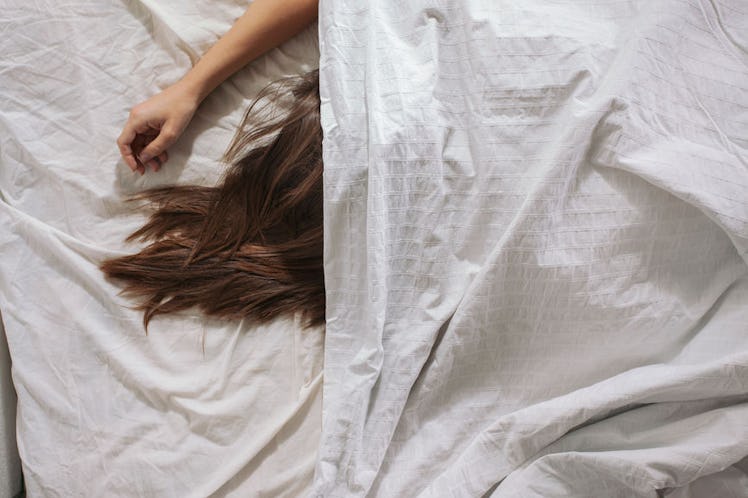
New Research Says There Are 5 Different Types Of Insomnia & Here's Why That's A Big Deal
If habitual sleeplessness plagues you, then you know that all the "surefire" sleep tricks in the book don't always work. Like most things when it comes to your health and well-being, there is no one-size-fits-all method to solving sleep troubles. Plus, new research shows that there are different types of insomnia — five, in fact — so identifying which kind you might have could prove to be a real game-changer when it comes to your sleep schedule.
These five different types of insomnia were discovered and identified by researchers at the Netherlands Institute for Neuroscience, whose work was recently published in the mental health journal The Lancet Psychiatry. The researchers wrote in their paper that insomnia is the "second most prevalent mental disorder," and that it's also a major factor in depression. But the research on the underlying causes of insomnia, the study authors wrote, have thus far been inconsistent, which is why these researchers were so keen on identifying different types and working on treatments for each one.
In this particular study, the researchers gathered 4,322 adult volunteers over the age of 18 from a database called the Netherlands Sleep Registry, and surveyed them through 34 different questionnaires about their sleep habits, personality traits, lifestyle, and health history. Each volunteer filled out at least one questionnaire, according to the study.
From there, with additional sleep and lifestyle information provided by a second, non-overlapping group of volunteers, the researchers were able to identify a series of insomnia "subtypes." In other words, the researchers basically identified and compared different personality traits in relation to sleep troubles, and apparently, five different types of insomnia emerged from the results.
Here's how it all broke down, as per the Netherlands Institute for Neuroscience's press release:
Type 1 scores high on many distressing traits such as neuroticism and feeling down or tense. Types 2 and 3 experienced less distress and were distinguished by their high versus low sensitivity to reward. Type 4 and 5 experienced even less distress and differed by the way their sleep responded to stressful life events.
Essentially, the researchers concluded that identifying subtypes of insomnia can get them a whole lot closer to recognizing what causes the sleep condition for each individual, making the effectiveness of personalized treatments a lot more possible. This is great news! Or, if I may, great snooze. (Sorry.)
Now, as for identifying and treating your own insomnia if it's a struggle for you, Martin Reed, certified clinical sleep health expert and founder of Insomnia Coach, tells Elite Daily that the common theme here between all five of the traits involved distress, so considering what it is that distresses you is your first and foremost priority. Is it a recent breakup? Anxiety about the future? Physical discomfort?
"The five insomnia types did not differ at all on sleep complaints like difficulty falling asleep versus early morning awakening," Reed, who was not directly involved in the research, explains.
In his professional opinion? "This means that cognitive behavioral therapy for insomnia (CBT-I) remains the best choice for treating chronic insomnia, regardless of 'type.'"
"Working one-on-one with a sleep coach or CBT-I therapist will always offer the best results because techniques can be adapted to best suit the individual client," Reed tells Elite Daily.
However, he adds, this study absolutely serves as a reminder of the importance of personalization, and that a generic course of therapy doesn't have to be the "one-size-fits-all" solution to insomnia. Regardless, reaching out for help from a health professional is always a good first step.